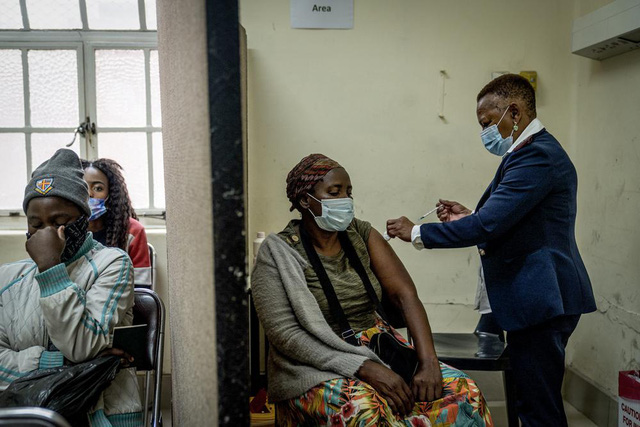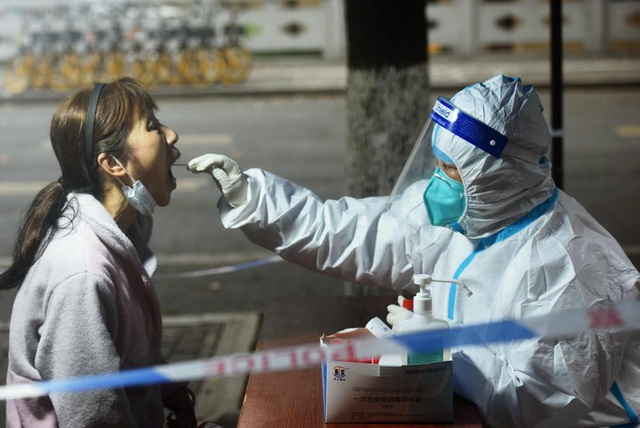Southeast Asia moves to consider COVID-19 as an endemic disease, China has its first COVID-19 death since January 2021
More than 468.99 million people worldwide have contracted the SARS-CoV-2 virus. (Photo: AP)
The country most affected by the epidemic COVID-19 still America with over 81.39 million cases and more than 997,200 deaths. In the past day, the US recorded nearly 3,400 more people SARS-CoV-2 virus infection.
White House medical adviser Dr Anthony Fauci warned that, in the next few weeks, the number of new COVID-19 cases in the US could rise again after a recent decline. Speaking to ABC News, Dr Fauci said: “I wouldn’t be surprised if over the next few weeks the downward trend in new cases will level off somewhat, maybe even increase.” “Whether that leads to another spike, or perhaps a small or medium rally, these possibilities are unclear as there is so much going on right now,” he said. now on.”
In the US, the number of new COVID-19 cases has decreased over the past 2 months, with the new exposure rate at more than 30,000 cases/day. Dr Fauci’s forecast is based on the UK case, where new positive cases have begun to increase slightly again.
At the world’s second largest COVID-19 epidemic center Indiaon March 19, the country recorded a total of over 43 million people with COVID-19, including more than 516,300 deaths from COVID-19 in this South Asian country.
From March 27, India will officially resume international commercial flights after 2 years of limited operation. The decision was made based on advice from experts, vaccination speed and vaccine coverage from countries around the world. Travelers to India are still required to have a vaccination certificate, a negative PCR test result 72 hours before flying. To promote the recovery of the aviation industry, airlines also plan to add more flights for the summer tourist season. Ticket prices will be reduced compared to previous times.
Brazil Currently, it is the world’s third largest epidemic hotspot with more than 656,800 COVID-19 patients out of a total of over 29.57 million infected people in this country.
President El SalvadorMr. Nayib Bukele announced, the country has started injecting vaccine against COVID-19 nose 4 for people over 12 years old and also foreigners regardless of immigration status. The leader of El Salvador said that the vaccination is completely voluntary, people can get the 4th dose 90 days after the 3rd dose and do not need to register in advance.
El Salvador has abolished the requirement to have negative test results for SARS-CoV-2 virus and vaccination records for people entering from November 17, 2021. Recently, the country also imported a batch of antiviral drug Molnupiravir to treat adult COVID-19 patients at risk of severe disease.
According to official figures, El Salvador has recorded nearly 161,000 cases of COVID-19, of which over 4,100 have died. The country of 6.7 million people plans to immunize 5.7 million people and so far 4.5 million people have received at least one dose of the vaccine, while 4.4 million people have been vaccinated with doses 2 and 1. ,4 million people received booster shots. More than 30,000 foreigners in El Salvador have been vaccinated.

The rate of vaccination against COVID-19 in Africa has increased. (Photo: AP)
The World Health Organization (WHO) said that in the first two months of this year, the rate of vaccination against COVID-19 in Africa has increased by about 15%. This is the result achieved after a number of countries in the region organized mass vaccination campaigns. According to recorded data, in February, Africa injected a total of 62 million doses of vaccine, up from 54 million doses in January. Many populous countries such as Democratic Republic of Congo, Ethiopia, Kenya and Nigeria have launched mass vaccination campaigns.
According to statistics, Africa is only fully vaccinated for about 15% of adults. About 435 million vaccines out of a total of 714 million doses received, accounting for 61%, have been administered to the population.
Currently, a variety of countries Southeast Asia has been gradually reopening the border and restoring the economy. This is possible thanks to the successful implementation of vaccination campaigns. The next goal for many countries will be to move towards treating COVID-19 as an endemic disease, living with COVID-19 like seasonal flu. Countries expect that the opening and living together campaigns will help flexibly adapt when the epidemic has tended to subside, the rate of severe illness and death will decrease, and at the same time, help accelerate the economic recovery process. post-pandemic.
From April 1 to, Malaysia begin the transition to treat COVID-19 as an endemic disease and open borders to international visitors. With this change, the operating hours limit for properties will be lifted. Fully vaccinated international visitors will not need to be quarantined upon entering Malaysia.
The Prime Minister of Malaysia stated: “The transition to endemic disease is an exit strategy from the pandemic to bring us all back to a near-normal life after more than 2 years of fighting COVID-19. The process This transition is only temporary before the country officially enters the stage where COVID-19 is considered endemic according to WHO criteria.”
Thailand also approved a 4-step plan to transition to the stage of considering COVID-19 as an endemic disease from July 1. To consider COVID-19 as an endemic disease, the mortality rate must not exceed 0.1%, currently this rate is close to 0.2%.
Indonesia is preparing a roadmap to transition from a pandemic to an endemic disease. Travel activities have also been relaxed. Since the beginning of March, Indonesia has piloted quarantine-free travel with international visitors to Bali and the Riau Islands.
Singapore is the first country in Southeast Asia to prepare a plan to live with COVID-19 from August 2021.
From April 17 to, Myanmar will open to welcome passenger flights and resume regular flights after 2 years of complete border closure due to the COVID-19 epidemic. This decision aims to revive the tourism industry, restore business activities and facilitate international visitors to Myanmar. According to the Myanmar Ministry of Health, foreign visitors will have to isolate for a week, perform two PCR tests and must have a certificate of full vaccination.
Myanmar’s tourism industry has been severely affected during the COVID-19 pandemic. Since the end of last year, the Myanmar government has left open the possibility of reopening this year to foreign tourists.

China has recorded the first 2 deaths from COVID-19 in the past 1 year. (Photo: AP)
Malaysia is promoting the vaccination of children against COVID-19 in the context of the increasing number of children hospitalized and receiving intensive treatment because of COVID-19. Officials in this country said that parents need to vaccinate their children as soon as possible because the rate of children developing allergies after vaccination of Pfizer and Sinovac is very low. At the same time, the Malaysian health agency also emphasized that people need to follow official information from the Ministry of Health, should not listen to fake news about vaccines.
AFP news agency quoted the announcement on March 19 of the Health Commission China (NHS) said that the country has recorded 2 deaths due to COVID-19. These are the first deaths since January 2021. According to the NHS, both of these cases are in Jilin province, northeastern China. In the past 24 hours, the country recorded an additional 4,051 new cases, down from 4,365 cases recorded a day earlier.
In his speech on March 17, Chinese President Xi Jinping stated that the country still pursues the “Zero COVID” strategy. Tens of millions of people in the country have now been ordered to stay at home to contain and quell the new outbreak. Authorities also announced that those with mild symptoms can be isolated at central isolation facilities, instead of going to specialized hospitals as before.
Getting vaccinated against COVID-19 does not increase the risk of neurological diseases. This conclusion has just been made by researchers after reviewing and evaluating the status of more than 8 million people who have received at least one dose of vaccines from AstraZeneca, Pfizer-BioNTech, Moderna or Johnson & Johnson.
The study also included 735,870 unvaccinated people who tested positive for SARS-CoV-2 virus, as well as older data on 14.3 million people in the general population for a baseline assessment of the situation. neurological diseases before the pandemic.
However, the researchers found an increased incidence of peripheral 7th nerve palsy, inflammation of the brain and spinal cord, and Guillain-Barr syndrome in people who had recovered from COVID-19. Therefore, the researchers believe that further research is needed on the long-term effects of the vaccine and infection with the SARS-CoV-2 virus, as well as the impact of the vaccine on different age groups. In addition, the researchers confirmed that the COVID-19 vaccine does not appear to be the main cause of neurological diseases.
* Invite readers to watch programs broadcast by Vietnam Television on TV Online and VTVGo!
at Blogtuan.info – Source: vtv.vn – Read the original article here



